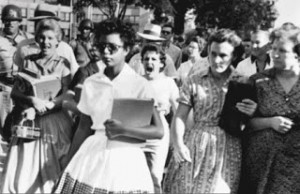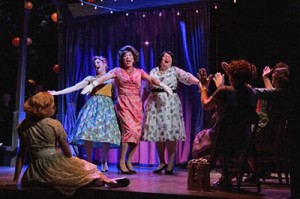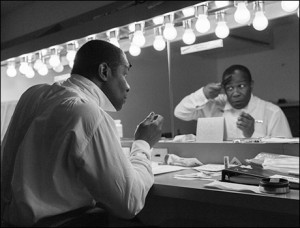In today’s Wall Street Journal I report on two Chicago-area musical productions, TimeLine Theatre’s Juno and Writers’ Theatre’s Days Like Today. Here’s an excerpt.
* * *
Marc Blitzstein’s theatrical career was launched with the big bang of “The Cradle Will Rock,” the pro-labor agitprop musical whose 1938 premiere came close to starting a riot. He never succeeded in building on his youthful triumph, though: “Regina,” his operatic version of “The Little Foxes,” ran for a paltry 56 performances, and “Juno,” in which Blitzstein took on the even more formidable challenge of carving a Broadway musical out of Sean O’Casey’s “Juno and the Paycock,” was an even bigger flop that closed in just under two weeks. Nor has it ever been successfully revived, in New York or anywhere else, which makes TimeLine Theatre Company’s new production of “Juno” important by definition….
 The troubles with “Juno” are twofold. If you saw the Irish Repertory Theatre’s flawless 2013 revival of “Juno and the Paycock,” you won’t need to be reminded that O’Casey’s shatteringly black comedy about a ne’er-do-well braggart (played here by Ron Rains) and his despairing wife (Marya Grandy), is one of the greatest plays to come out of Ireland. Unfortunately, Joseph Stein’s book is so faithful to its source that “Juno” feels more like a play with music than a genuinely original show. In addition, Blitzstein’s songs, “For Love” and “I Wish It So” excepted, lack the expressive weight that so powerful a play demands. As a result, you come away wondering why he chose to write a traditional musical (albeit one with an unhappy ending) instead of giving “Juno and the Paycock” the full-fledged operatic treatment for which it cries out.
The troubles with “Juno” are twofold. If you saw the Irish Repertory Theatre’s flawless 2013 revival of “Juno and the Paycock,” you won’t need to be reminded that O’Casey’s shatteringly black comedy about a ne’er-do-well braggart (played here by Ron Rains) and his despairing wife (Marya Grandy), is one of the greatest plays to come out of Ireland. Unfortunately, Joseph Stein’s book is so faithful to its source that “Juno” feels more like a play with music than a genuinely original show. In addition, Blitzstein’s songs, “For Love” and “I Wish It So” excepted, lack the expressive weight that so powerful a play demands. As a result, you come away wondering why he chose to write a traditional musical (albeit one with an unhappy ending) instead of giving “Juno and the Paycock” the full-fledged operatic treatment for which it cries out.
So why see “Juno” now? Because Mr. Bowling’s focused, intimate small-scale staging minimizes its palpable problems—and because Ms. Grandy’s quietly determined interpretation of the title role is as moving in its own way as was J. Smith-Cameron’s towering performance in the Irish Rep revival of the play….
Broadway musicals, like Hollywood movies, rarely seek to portray contemporary middle-class urban adult life in anything like a straightforward way. Stephen Sondheim showed how to do it with “Company,” but that 1970 hit has had few successors. Indeed, the only Broadway shows to come along in recent years that cover remotely similar ground are “If/Then” and “Next to Normal,” both of which I found to be prettified and narcissistic. So I’m happily surprised to report that Writers’ Theatre, which gave us “A Minister’s Wife” in 2009, has now premiered a second chamber musical, “Days Like Today,” that does what “If/Then” purports to do, and does it with immensely promising originality….
* * *
Read the whole thing here.
Emily Berman sings “Where There Was Bone,” a number from Days Like Today:


 Louis Armstrong rarely spoke out in public about civil rights, or any other political matter. In September of 1957, though, he denounced the racial situation in Little Rock, where Orval Faubus, the governor of Arkansas, had ordered the National Guard to surround Central High School in order to prevent nine black children from enrolling there. Even when the guardsmen were joined by a threatening mob of white segregationists, President Eisenhower initially refused to take action to enforce Brown v. Board of Education, the 1954 Supreme Court decision ordering the desegregation of the public schools.
Louis Armstrong rarely spoke out in public about civil rights, or any other political matter. In September of 1957, though, he denounced the racial situation in Little Rock, where Orval Faubus, the governor of Arkansas, had ordered the National Guard to surround Central High School in order to prevent nine black children from enrolling there. Even when the guardsmen were joined by a threatening mob of white segregationists, President Eisenhower initially refused to take action to enforce Brown v. Board of Education, the 1954 Supreme Court decision ordering the desegregation of the public schools. Because Margolick’s story was published in a family newspaper, he used a fairly transparent euphemism to describe the colorful language that Armstrong had actually used to describe Faubus and John Foster Dulles, Eisenhower’s secretary of state. (If you’ve read Pops or seen Satchmo at the Waldorf, you know what he really said.) Margolick had interviewed Lubenow a few days earlier in a public presentation sponsored by New York’s Louis Armstrong House Museum and Archive, so I got in touch with Michael Cogswell, who runs the museum, and asked him to put me directly in touch with Lubenow. Cogswell gave me Lubenow’s e-mail address, and I wrote to him to confirm, among other things, that Armstrong had in fact used the “double-barreled hyphenated expletive” (it was a favorite of his) that I assumed he had used. He wrote back to assure me that I’d guessed right.
Because Margolick’s story was published in a family newspaper, he used a fairly transparent euphemism to describe the colorful language that Armstrong had actually used to describe Faubus and John Foster Dulles, Eisenhower’s secretary of state. (If you’ve read Pops or seen Satchmo at the Waldorf, you know what he really said.) Margolick had interviewed Lubenow a few days earlier in a public presentation sponsored by New York’s Louis Armstrong House Museum and Archive, so I got in touch with Michael Cogswell, who runs the museum, and asked him to put me directly in touch with Lubenow. Cogswell gave me Lubenow’s e-mail address, and I wrote to him to confirm, among other things, that Armstrong had in fact used the “double-barreled hyphenated expletive” (it was a favorite of his) that I assumed he had used. He wrote back to assure me that I’d guessed right.

 From the 1954 film version of
From the 1954 film version of 